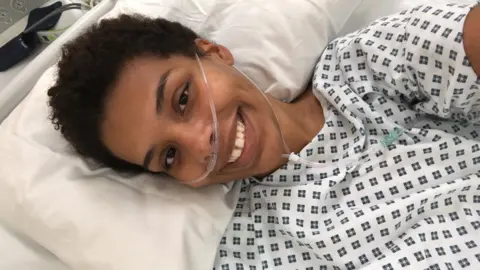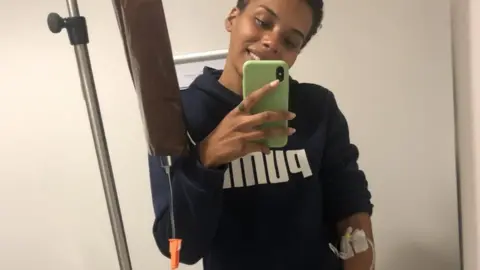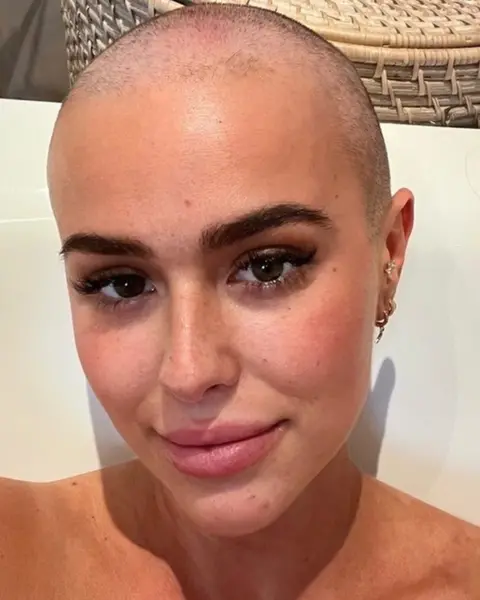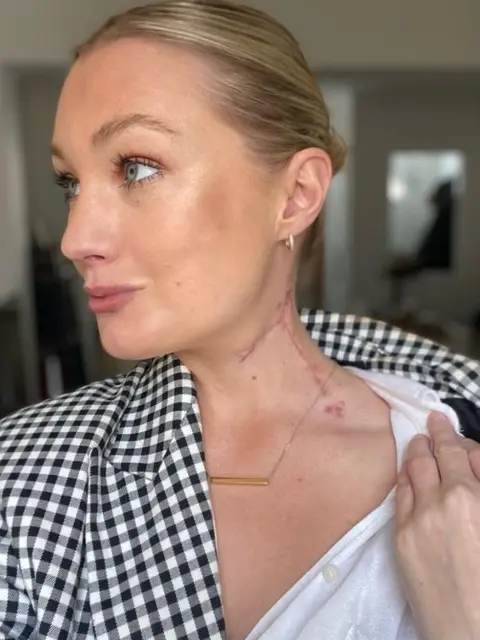World Cancer Day: 'GPs should take young people seriously'
 Jaelle Karinna
Jaelle KarinnaAfter five months of misdiagnoses, Jaelle Karinna was told she had cancer. She was 23, studying psychology at university and working part-time as a receptionist.
Now, after a gruelling year of chemotherapy, she says GPs need to pay more attention to young people's concerns when it comes to cancer.
Jaelle, from Finsbury Park in north London, visited doctors four times with unusual heavy bleeding and on one occasion went to A&E with palm-sized blood clots in her underwear. She was told the bleeding was likely to be hormonal and that there was nothing to worry about.
A month later, a different doctor diagnosed her with fibroids and hydrosalpinx - fluid blockage in the fallopian tubes.
After months of continuous bleeding throughout 2021, Jaelle was finally offered a smear test. When the results came, it turned out she had stage three cervical cancer that had spread to the lymph nodes in her stomach and pelvis.
"Doctors have a false sense of security that someone can be too young to have cancer," she said. "They dismiss concerns or explore every alternative before considering cancer for something that is very clearly a cancer symptom. If an older adult was displaying that same symptom, they would be checked for cancer."
 Jaelle Karinna
Jaelle Karinna A recent study by Teenage Cancer Trust found almost half (47%) of 18 to 24-year-olds put off going to see a GP with a health concern. The most common reasons given by young people was that it was too much hassle to get an appointment (47%) and they were worried about wasting their GP's time (45%).
Dr Louise Soanes, chief nurse of the trust, said that when young people did get an appointment, they often had to visit their GP multiple times before being referred.
"Cancer in younger age groups is considered rare, and so suspicion of cancer from GPs and other healthcare professionals is lower than it may be for other age groups," she said.
"However, early diagnosis is so important. So if you have a concern about your health, and don't feel like you're getting the answers you need, please keep going back and be persistent as your concerns should be taken seriously."
 Paris Wells
Paris WellsParis Wells, 28, from Biggin Hill in south-east London, kept going back to her doctor after she spotted a lump on her neck.
She was diagnosed with cancer a month after one doctor dismissed the lump as being down to a cold, while another told her the lump did not "feel cancerous". But it grew larger and harder over the next few weeks.
In April, Paris asked her aunt, a radiologist at the Princess Royal University Hospital in Orpington, Kent, if she could help arrange CT and MRI scans to double-check.
Tests showed the lump was caused by stage two Hodgkin lymphoma - a rare cancer that develops in the lymphatic system and spreads throughout the body. "I was annoyed at my GP at first because being told it doesn't feel cancerous, to then to be told it was cancer was hard to take," Paris said.
"Because of my age, they almost ruled out cancer straight away. I had a gut feeling all along, and continued to get a scan to make sure. I always had a gut feeling it was cancer, but to have it confirmed was a shock.
"I was crying a lot when I was diagnosed and felt scared about what was to come. I just felt scared more than anything."
Paris, who recently completed a year-long cycle of chemotherapy, said doctors should scan every lump to double-check for cancer. "It's possible less people will have to go through what I went through if the cancer is caught early enough."

'We know our bodies and when something isn't right'

Last year, I shared my story about the failure of the NHS to diagnose my skin cancer until it had spread.
By the time I received a diagnosis of stage three malignant melanoma, I needed surgery to remove 24 lymph nodes.
I love the NHS but I truly lost faith in the healthcare system when three doctors, including a dermatologist, failed to recognise that a growing blue-black mole indicated I could have skin cancer.
I was told I was too young and sent away without a biopsy being arranged. GPs need to treat young people's concerns seriously and listen to them.
We know our bodies and we know when something isn't right. Cancer shouldn't be ruled out because of someone's age.

Dr Gary Howsam, vice chair of the Royal College of General Practitioners, said diagnosing cancers in primary care was challenging.
"Many symptoms are likely to indicate more common, less serious conditions and GPs have to make a decision whether to refer for specialist testing based on the undifferentiated symptoms and risk factors - including age - of the patient in front of them," he said.
"GPs cannot refer every patient with signs that may possibly be due to cancer as it would overload specialist services, so their referrals need to meet certain thresholds.
"Despite advancing age being the largest risk factor for cancer, around 10% of all cancers are in those under 50, so if anyone of any age has any of the following persistent unexplained symptoms: a lump, bleeding, pain, shortness of breath or weight loss, they should contact their GP practice."
